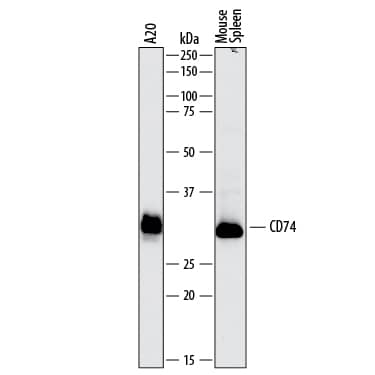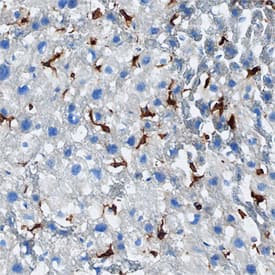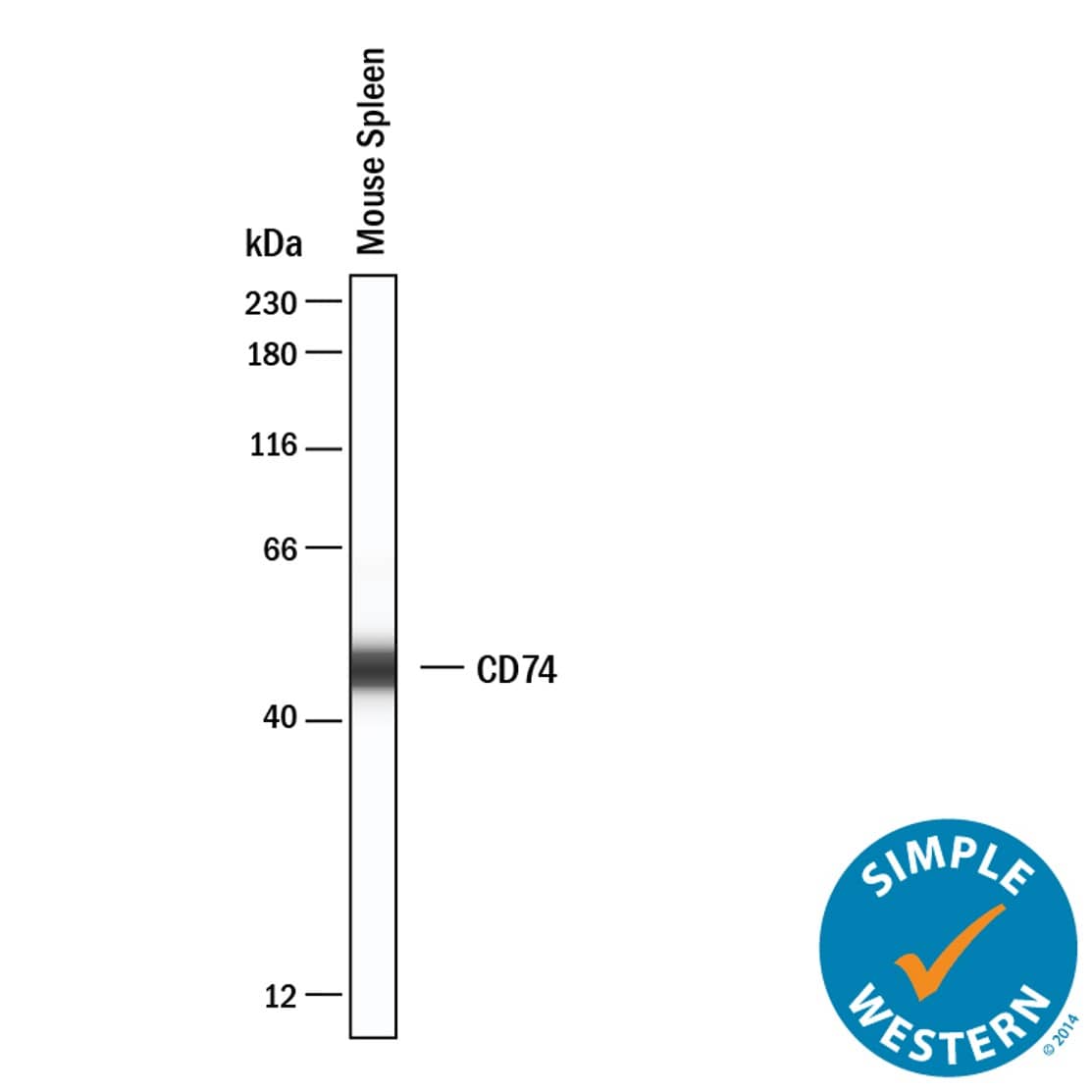Mouse CD74 Antibody Summary
Gln56-Leu215
Accession # NP_034675
Applications
Please Note: Optimal dilutions should be determined by each laboratory for each application. General Protocols are available in the Technical Information section on our website.
Scientific Data
 View Larger
View Larger
Detection of Mouse CD74 by Western Blot. Western blot shows lysates of A20 mouse B cell lymphoma cell line and mouse spleen tissue. PVDF membrane was probed with 2 µg/mL of Sheep Anti-Mouse CD74 Antigen Affinity-purified Polyclonal Antibody (Catalog # AF7478) followed by HRP-conjugated Anti-Sheep IgG Secondary Antibody (HAF016). A specific band was detected for CD74 at approximately 31-34 kDa (as indicated). This experiment was conducted under reducing conditions and using Immunoblot Buffer Group 1.
 View Larger
View Larger
CD74 in Mouse Liver. CD74 was detected in perfusion fixed frozen sections of mouse liver using Sheep Anti-Mouse CD74 Antigen Affinity-purified Polyclonal Antibody (Catalog # AF7478) at 1.7 µg/mL overnight at 4 °C. Tissue was stained using the Anti-Sheep HRP-DAB Cell & Tissue Staining Kit (brown; CTS019) and counter-stained with hematoxylin (blue). Specific staining was localized to stellate cells. View our protocol for Chromogenic IHC Staining of Frozen Tissue Sections.
 View Larger
View Larger
Detection of Mouse CD74 by Simple WesternTM. Simple Western lane view shows lysates of Mouse Spleen, loaded at 0.2 mg/mL. A specific band was detected for CD74 at approximately 47 kDa (as indicated) using 20 µg/mL of Sheep Anti-Mouse CD74 Antigen Affinity-purified Polyclonal Antibody (Catalog # AF7478) followed by 1:50 dilution of HRP-conjugated Anti-Sheep IgG Secondary Antibody (Catalog # HAF016). This experiment was conducted under reducing conditions and using the 12-230kDa separation system.
Reconstitution Calculator
Preparation and Storage
- 12 months from date of receipt, -20 to -70 °C as supplied.
- 1 month, 2 to 8 °C under sterile conditions after reconstitution.
- 6 months, -20 to -70 °C under sterile conditions after reconstitution.
Background: CD74
CD74 (also known as H2 class II histocompatibility antigen gamma chain and Ia antigen-associated invariant chain/Ii) is 31-41 kDa glycoprotein, member of no known protein family. It is expressed by multiple cell types, including dendritic cells, macrophages, immature and mature B cells, type II greater alveolar epithelial cells and colonic epithelium. CD74 is best known as an ER-embedded trimeric chaperone that directs MHC class II dimers through the endosome and into the cell membrane. When embedded in the endosome, it undergoes cleavage that both facilitates MHC dimer transit, and generates a cytosolic signaling fragment. It also appears on the cell surface where, in conjunction with CD44 (and possibly c-met), it binds MIF, inducing either cell proliferation, cell survival,or cytokine release. Mouse CD74 is a 279 amino acid (aa) type II transmembrane protein (SwissProt P04441). It possesses a 30 aa cytoplasmic region plus a 224 aa luminal/extracellular domain (aa 56‑279) that contains one thyroglobulin type-1 repeat (aa 193-254). CD74 is known to be phosphorylated on Ser9, and occasionally undergo glycanation with chrondroitin at Ser265 (on monocytes and B cells). There are multiple potential splice forms. The isoform used for antibody formation by R&D Systems, Inc. exhibits a deletion of aa 192-255 (GenBank NP_034675). Two other splice forms show either the same deletion just described coupled to a four aa substitution for aa 277-279, or a 10 aa substitution for aa 131-279. Over aa 56-215 of the NP_034675 isoform, mouse CD74 shares 86% and 69% aa sequence identity with rat and human CD74, respectively.
Product Datasheets
Citations for Mouse CD74 Antibody
R&D Systems personnel manually curate a database that contains references using R&D Systems products. The data collected includes not only links to publications in PubMed, but also provides information about sample types, species, and experimental conditions.
6
Citations: Showing 1 - 6
Filter your results:
Filter by:
-
MIF-2/D-DT enhances proximal tubular cell regeneration through SLPI- and ATF4-dependent mechanisms
Authors: Akinobu Ochi, Dong Chen, Wibke Schulte, Lin Leng, Nickolas Moeckel, Marta Piecychna et al.
American Journal of Physiology-Renal Physiology
-
IRF8-mutant B cell lymphoma evades immunity through a CD74-dependent deregulation of antigen processing and presentation in MHCII complexes
Authors: Qiu, Z;Khalife, J;Ethiraj, P;Jaafar, C;Lin, AP;Holder, KN;Ritter, JP;Chiou, L;Huelgas-Morales, G;Aslam, S;Zhang, Z;Liu, Z;Arya, S;Gupta, YK;Dahia, PLM;Aguiar, RCT;
Science advances
Applications: Westen Blot -
IRF8-mutant B cell lymphoma evades immunity through a CD74-dependent deregulation of antigen processing and presentation in MHC CII complexes
Authors: Qiu, Z;Khalife, J;Lin, AP;Ethiraj, P;Jaafar, C;Chiou, L;Huelgas-Morales, G;Aslam, S;Arya, S;Gupta, YK;Dahia, PLM;Aguiar, RCT;
bioRxiv : the preprint server for biology
Species: Mouse
Sample Types: Cell Lysates
Applications: Western Blot -
Tissue Inhibitor of Metalloproteinases-1 Interacts with CD74 to Promote AKT Signaling, Monocyte Recruitment Responses, and Vascular Smooth Muscle Cell Proliferation
Authors: Ebert, S;Zang, L;Ismail, N;Otabil, M;Fröhlich, A;Egea, V;Ács, S;Hoeberg, M;Berres, ML;Weber, C;Moreira, JMA;Ries, C;Bernhagen, J;El Bounkari, O;
Cells
Species: Human
Sample Types: Whole Cells
Applications: Immunocytochemistry -
Epithelium- and endothelium-derived exosomes regulate the alveolar macrophages by targeting RGS1 mediated calcium signaling-dependent immune response
Authors: Z Feng, J Zhou, Y Liu, R Xia, Q Li, L Yan, Q Chen, X Chen, Y Jiang, G Chao, M Wang, G Zhou, Y Zhang, Y Wang, H Xia
Cell Death and Differentiation, 2021-03-22;0(0):.
Species: Mouse
Sample Types: Protein
Applications: ELISA Control -
CD74 signaling links inflammation to intestinal epithelial cell regeneration and promotes mucosal healing
Authors: L Farr, S Ghosh, N Jiang, K Watanabe, M Parlak, R Bucala, S Moonah
Cell Mol Gastroenterol Hepatol, 2020-01-28;0(0):.
Species: Mouse
Sample Types: Whole Tissue
Applications: IHC
FAQs
No product specific FAQs exist for this product, however you may
View all Antibody FAQsReviews for Mouse CD74 Antibody
There are currently no reviews for this product. Be the first to review Mouse CD74 Antibody and earn rewards!
Have you used Mouse CD74 Antibody?
Submit a review and receive an Amazon gift card.
$25/€18/£15/$25CAN/¥75 Yuan/¥2500 Yen for a review with an image
$10/€7/£6/$10 CAD/¥70 Yuan/¥1110 Yen for a review without an image
